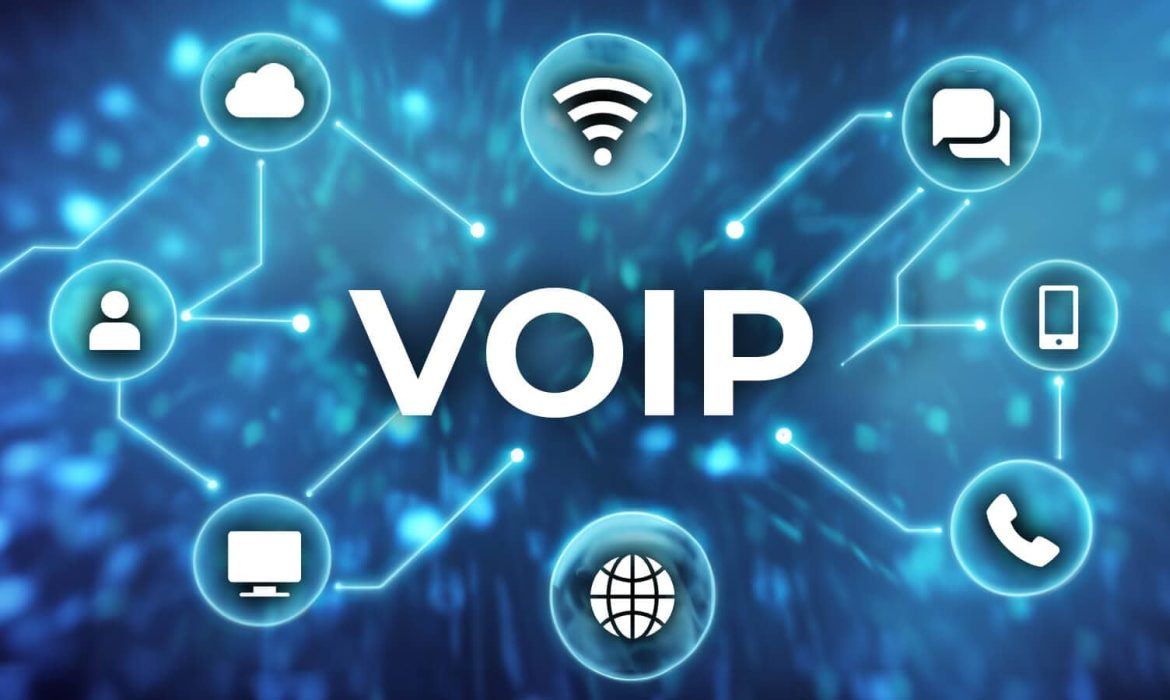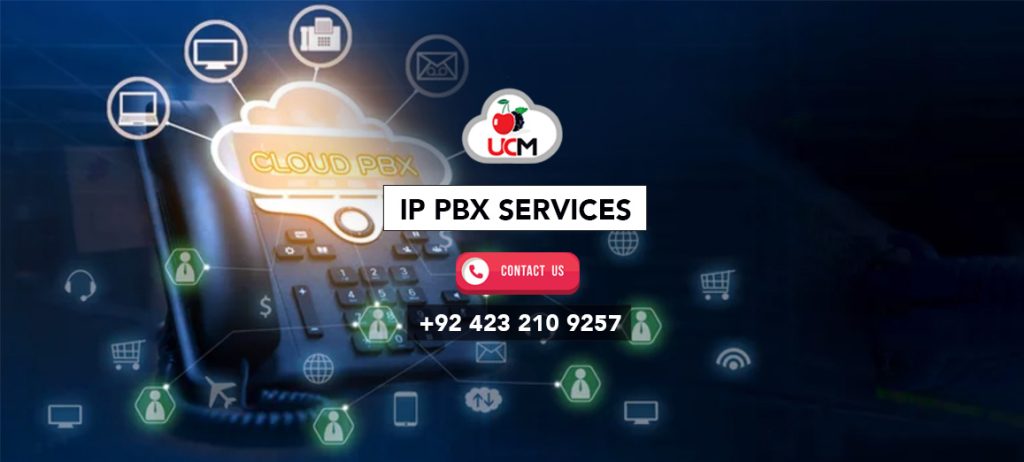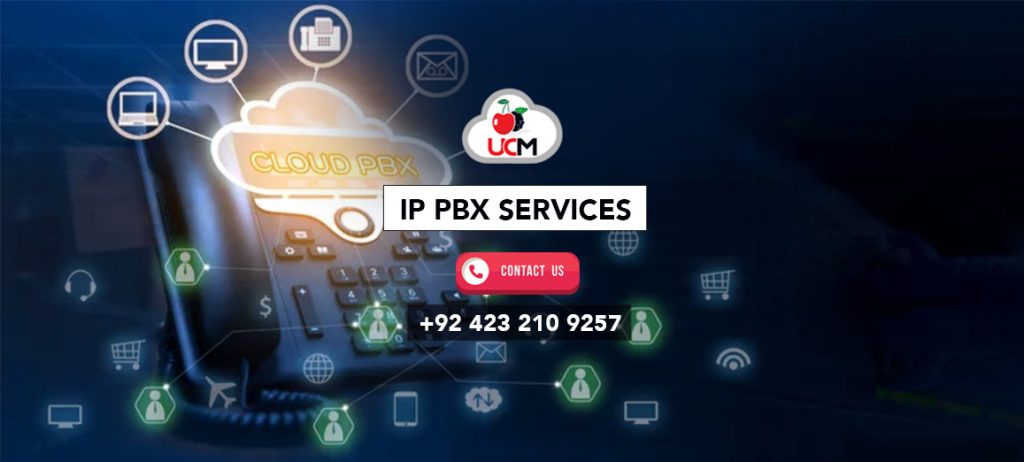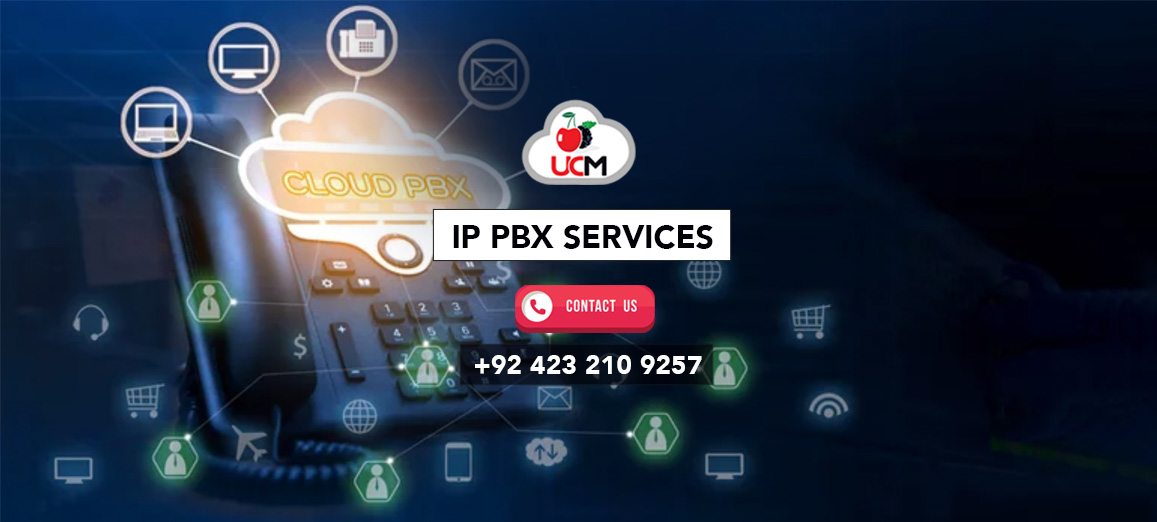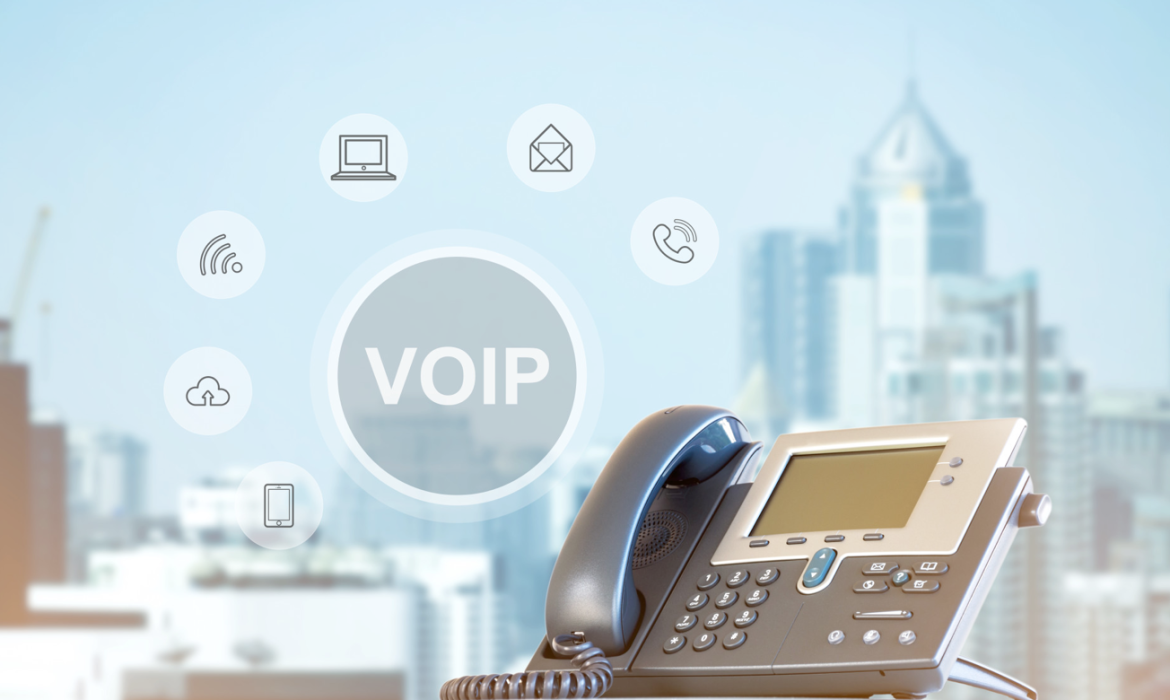From Traditional PBX to VoIP PBX: A Comprehensive Transition Guide
Why Switch to Advanced VoIP PBX?
Today, companies have adopted remote and hybrid approaches besides in-office work to manage communication challenges. There is a need to ensure a smooth flow of internal and external communication and solve issues efficiently. This feat seems impossible with the conventional phone system, but you can manage your communication just like your business needs with an advanced VoIP PBX system. Being costly and less flexible, traditional PBX has phased out and is being replaced by the latest VoIP to provide seamless communication inside and outside your business. If you are considering upgrading to an advanced phone system, this blog is to address your concerns.
What is a VoIP PBX System?
This advanced technology is a great solution for connecting multiple phone lines of a business. It enables your employees to speak to each other and outside clients on the Internet without using a public telephone network. Traditional PBX contains hardware and uses a public telephone network for incoming and outbound calls, was quite expensive and limited in functionality. However, advanced VoIP-based PBX use the internet and are more flexible, affordable and feature-rich. These systems send and receive data over IP networks by converting analogue signals into digital data to transmit over the internet. They are also cheap to maintain and implement making them the best choice for small and medium-sized companies.
Evolution Journey of VoIP-Based PBX Systems
Analogue Era: Traditional PBX
The earlier legacy systems operated on analogue technology comprised copper wiring and physical switchboards. The analogue PBX has limitations in terms of functionality, features and scalability. Companies had to depend on manual operators to manage extensions and connections which increased operational costs and led to inefficiencies.
Transition to Digital: IP PBX System
Later, the Internet reshaped the communication infrastructure. With the advent of IP technology, the PBX system underwent a huge transformation. These systems use the power of the Internet to transmit voice data and offer seamless integration with other tools and services. This transition offers unified communication solutions to businesses, enabling them to access voice, video, and messaging from a single place.
More Advancement: VoIP-Powered PBX
Advanced VoIP phone systems manage and route business calls using the internet connection. This flexible and cost-effective solution for all-sized enterprises allows you to make and receive calls on VoIP PBX phone systems Providers or softphones. Companies can also get advanced features like voicemail, conference calling, and integration to improve productivity and enhance communication efficiency. These are even the best options for companies that employ remote teams. They can access the system and benefit from all features your internal teams use.
Step to Migrating from Legacy Systems to VoIP Technology
Before upgrading to advanced VoIP-based PBX, consider these key points to ensure a smoother transition.
Evaluate Your Existing Infrastructure
First, review your existing communication infrastructure to determine which PBX system you are using. This also includes information about its capacity and the condition of cables and equipment. This analysis will provide detailed insights about where to start and what you need for the transition.
Set up an Interdepartmental Team
Your entire business relies on a communication system so you should efficiently address the communication concerns in different departments. You can pick representatives from teams such as IT, customer service, HR and operations to help them understand potential challenges and technical aspects. Consider technical and non-technical departments to establish a foolproof VoIP migration strategy and optimise business communication.
Choose a Reliable VoIP Service Provider
The next step is to search for the right partner to start your VoIP journey. Do research on different service providers and compare their price plans and offerings as well as your budget. Collect information about the features they offer, the reputation they have and the level of support they provide. Don’t make the quick decision but choose the service provider that suits your business needs.
Train Your Employees
After selecting the service provider, concentrate on training your team. Although upgrading to a VoIP system can be a huge change for your employees, getting them ready for the transition is important. You can provide them with training about using the new system, familiarise them with new features and address their concerns through videos or tutorials. Trained and well-informed employees will make the migration smoother and easier.
Develop Network Infrastructure
Proper connectivity infrastructure is also important for a seamless transition. These advanced communication systems depend on internet connectivity. Thus, you should know that an unstable and weak connection can lead to a call dropping due to poor call quality. Import your existing phone numbers to the new service, backup voicemails, and other configurations from the previous provider. Ask your service provider to check the existing numbers to ensure everyone reaches you easily.
Strategise Your Migration Plan
To ensure a successful migration, companies must create a business plan that breaks down resources, expenses and deadlines. A robust disaster recovery plan can further reduce the risks of data loss as a result of data breaches and system failure. Following the guidelines can ensure a seamless and smooth transition from PBX to advanced VoIP systems.
Ensure Proper Security Measures
Your business phone system should not be vulnerable to security threats. Don’t let cybercriminals access sensitive business information and affect your business communication. Establish strong security protocols like encryption and firewalls and regularly update your system. Implementing multi-factor authentication, proper encryption and authorised user access can ensure data security over the network.
PBX to VoIP Migration Testing
In this step, it is checked whether everything is going according to plan. Your service provider conducts a practical evaluation before configuring the new system and tests every app, software and integration to avoid networking issues and finalise last-minute adjustments. After successful migration, you can implement tests to check the quality and clarity of audio calls, business tool integrations, call routing and forwarding and conduct performance tests to ensure everything functions correctly and efficiently.
What are the Three Phases in the Transitional Approach for IP PBX?
- Phase 1: Adding IP PBX: In the first stage, the service provider adds an IP PBX and IP/SIP phones to the existing network to create a telephonic connection between PSTN, PBX, and IP/LAN. The IP PBX uses the current PRI trunk and offers a three-legged solution and smart way to connect teleworkers, remote offices, features, and providers.
- Phase 2: Addition of Ports & Trunks-Natural Expansion: It lets companies add more telephony ports to facilitate the natural expansion of the network. They can also benefit from a USB-based channel bank to expand extensions.
- Phase 3: Remove the Legacy System: Finally, when your system is ready to replace the traditional PBX, eliminate the legacy PBX. Now, you must rely completely on your IP system to meet their business telephony needs.
Top Advantages of Transitioning from PBX Setup to VoIP Systems
Companies always ask about the benefits of migrating to VoIP and why it is better than a legacy system. Advanced VoIP-based PBX offers countless benefits, such as you can transfer countless multimedia files or doing video calls with your device. Moreover, they are cheaper and provide better call quality than legacy systems. Let’s learn in detail why advanced VoIP technology is a better option.
VoIP are Scalable & Flexible
Unlike legacy systems tied to a single location, VoIP systems are more flexible allowing users to access the system and make or receive calls on any device, any time, anywhere. These systems are highly adaptive to the changing business needs and allow users to remove or add lines or scale up or down considering business needs through software. Furthermore, you did not need expensive hardware upgrades or physical installations as required in the legacy system.
Cost-efficiency is Another Plus Point
Traditional systems require high initial costs for developing and maintaining infrastructure. Thankfully, VoIP systems facilitate communication over the Internet so you do not need to invest in infrastructure and maintenance, it is also your vendor’s responsibility. You can make long-distance calls to multiple countries easily without paying a huge long-distance calling fee. Businesses can manage high-volume calls efficiently and integrate the system with existing tools and apps to increase efficiency.
They are Easier to Operate
Moving from a traditional to a VoIP system means accessing features that are not available in the legacy system. Additionally, upgrading in PBX is time-consuming and requires source parts but VoIP systems can be upgraded in a few clicks. You can use the system anywhere, making it the best solution to continue your business, even on the go.
Comprises Advanced Features
Unified communication channels such as email, messaging, and voice calls, all available in one application, can streamline business communication. Team members can easily switch between different platforms or apps to get the information they need. Incoming calls are automatically routed to the most suitable agent or extension,n depending on the caller’s needs. This ensures the call always connects with the right person/ department/extension to keep the customer satisfied.
Support Mobility & Remote Work
Many businesses have staff who work remotely or travel regularly. VoIP solutions give your business access to their internet-connected devices wherever and whenever. For instance, they can make and receive calls through softphone mobile apps, talk to customers and collaborate internally without wasting their time. Indeed, VoIP systems are suitable for companies that employ remote professionals to improve service quality.
Offer Ease of Integration
VoIP systems offer countless integrations, especially integrating customer relationship management systems to provide real-time access to customer information. Companies can analyse customers’ activities and interactions, highlight pain points and offer efficient and personalised service. They can integrate countless tools to improve service quality.
Future-Proof Solution
Legacy systems are outdated now, and enterprises still use them, facing limited support and compatibility issues. Conversely, VoIP systems are simple to update and more future-proof, allowing companies to continue benefiting from the latest technology. These systems are more compatible with chatbots and AI, ensuring more personalised and automated conversations.
Secure Calling & Versatility
VoIP systems provide secure calling to keep information protected from hacking. Meanwhile, authentication features ensure that only authorised persons can access the system to ensure security. Thus, this functionality makes VoIP solutions more secure than traditional legacy systems vulnerable to hacking and other security issues. They offer advanced features such as video conferencing allowing your employees to communicate face-to-face. Moreover, you can mark your local presence in multiple locations to enable customers to trust your services.
Provide Clearer Call Quality & Increase Productivity
Another advantage of VoIP is clearer voice quality due to advanced codecs. These codecs compress or decompress voice signals to provide more natural-sounding calls. They also contain noise-reduction features that further reduce background noise to make the voice easy to understand. Your teams can understand the issue and provide faster solutions. Furthermore, collaboration becomes easier among your employees, and efficient communication further increases productivity.
Easier Employee Management & Wireless Communication
Administration can easily add agents or employees and manage them through apps. They just need to log on to the admin app and add users by filling out their basic details. Moreover, admin staff can also delete or modify the user whenever required. Additionally, removing and deploying phone numbers is also not necessary but your teams can communicate through their devices. This also saves money by eliminating the need for separate desk phones or landlines for each agent. They can manage internal and external communication through softphone apps on their devices allowing them to connect from anywhere.
Final Thoughts: A Way Forward
Do you think your legacy system holding your business back? Today, it has become more challenging than ever to keep everyone connected. However, the Best VoIP PBX Services In Lahore can enable you to communicate easily, no matter where your team is. Another plus point is that you can save your hard-earned money by switching from an old-fashioned phone system. Are you considering migrating from a legacy system to the latest VoIP and searching for a reliable vendor? Look no further and contact CherryBerry UCM experts to get the communication system that skyrockets your business communication to new heights!
Why Cloud-Hosted VoIP Phone Systems Are Shaping the Future of Business Communication
Why are Cloud-Hosted VoIP Phone Systems Important?
With customer expectations rising and remote work becoming common, companies seek innovative cost-efficient solutions to ensure effective business communications. The traditional phone systems, once the backbone of communication, are expensive and outdated in today’s digital age where flexibility and scalability are the key to success. Enter Cloud-Hosted VoIP Phone Systems as future-proof solutions for all-size companies transforming internal and external business communication. Its ability to manage interactions seamlessly, enhance flexibility, and reduce costs has made cloud VoIP an essential tool for companies over the years.
What are Cloud-Hosted VoIP Phone Systems?
Instead of traditional phone lines and physical wires, the advanced cloud-based VoIP systems are powered by an internet connection to handle incoming and outgoing calls. They work like conventional landline systems with only one key difference, they are hosted in the cloud. Interestingly, new VoIP telephony has replaced ISDN and PSTN phone systems to ensure continuous services. Flexibility, security, ease of access, and scalability are other reasons that make the traditional phone system obsolete. Meanwhile, VoIP systems have significantly impacted the efficiency of companies across various industries so utilising its potential is crucial to improve business productivity.
Understanding the VoIP Phone Systems
VoIP converts analog signals into digital data packets to transmit voice data. Meanwhile, it depends on packet-switched networks leading to efficient use of business resources. Companies can use broadband internet connection to communicate internally and externally rather than installing conventional phone lines. Here are a few features of this technology:
- Digital Data Transfer: It converts the analog voice signals into data packets.
- Internet-based Communication: The technology uses a broadband internet connection for calls.
- Flexible Device Usage: You can access VoIP technology through computers, mobile devices, or phones.
- Resource Utilisation: Companies can benefit from packet-switched networks to save costs and resources.
- Flexibility & Integration: VoIP infrastructure allows companies to integrate the phone system seamlessly with existing business communication systems increasing overall efficiency.
How Business Communication Evolves?
Traditional phone systems were standard for many years but had some limitations in terms of flexibility and costs. This is why companies have switched from analog to digital communication. Meanwhile, internet integration proved a turning point for business communication and promoted unified communication methods. Nowadays, instant messaging, email, and video conferencing have become integral parts of a business allowing more flexible and faster communication. Even VoIP has eliminated the need to develop costly infrastructure and phone lines making communication more scalable and efficient. Let’s take a look at different business communication systems.
- On-Premises PBX System: This phone system is physically installed in office premises and consists of wires connecting office data centers with employee desk phones. The main PBX system or server is placed inside your office. These phone systems can be expensive to establish because of costly equipment and infrastructure requirements. Moreover, it needs more integration capabilities. Your teams can only access the system on the office premises so it does not facilitate remote working. Additionally, maintenance is inevitable and you need a dedicated IT team to repair these problems that can add additional costs to your business.
- Cloud-based VoIP solutions: Cloud telephony system works similarly to on-premises systems with the only difference being the way calls are made using an internet connection. It gives companies much freedom and flexibility to work as they don’t have to develop setups like in legacy systems. Furthermore, cloud systems are cheaper than their traditional phone systems as you only pay for the services you are using, no extra cost is required. Likewise, as the connection is developed through VoIP, it also facilitates remote working teams. Your distributed workforce from all around the globe can make phone calls and join conference calls by installing VoIP software on compatible devices.
Which is Best to Invest in for Your Business? A VoIP or Traditional PBX?
It has become clear that on-site PBX systems come with limited features and large upfront costs. However, it does not mean companies should rule them out completely because they still suit some companies’ needs. But how do you know which is the best system for your business communication or decide whether switching to the cloud can benefit your business? Consider the questions below to make the best decision for your business.
1. How Much Budget Do You Have to Invest?
No doubt the most important thing while deciding between on-premises and hosted VoIP systems is your budget or investment cost. The service provider of both phone systems will provide you with an estimate of upfront and monthly service costs. However, overall cloud-based VoIP is much cheaper than on-premises phone systems in total cost. This is because you only have to pay a monthly fee for the service and maintenance as your service provider remotely manages all this without disrupting services. You do not need an IT team for repairs, updates or maintenance. Meanwhile, setup costs are minimal and you can also facilitate remote employees.
2. Do You Want to Facilitate a Remote Team?
On-premises phone systems do not facilitate remote team members. The main reason is that a phone connection is made inside the office from PBX to the devices. This is why on-premises phone systems are not a good choice for companies that employ remote teams. On the other hand, cloud solutions facilitate remote working allowing them to use the system from anywhere globally to access their business phone system through VoIP. They just need a strong internet connection to make and receive business calls. Interestingly, the call quality is also better so if you are looking to expand your business internationally, investing in the cloud VoIP is an ideal choice.
3. Do You Want to Expand Your Team Globally?
A cloud-hosted phone system offers more flexibility and scalability than its traditional alternative. The reason is that you don’t need to connect the extra wire to the data center. You can add another line using an online account or create a new team member account instantly. Furthermore, you can also use the business number on existing devices which means the expansion is easier with hosted VoIP. It is a superb solution for your growing teams and call management is also easier. Thus, if you plan to expand your business by hiring professionals from a global talent pool in the coming years, choose cloud-based IP phone systems to streamline your business communication.
4. How Much Control You Need On Your Business Phone System?
An on-site phone system is suitable if you want complete control over your business phone system. It gives you direct control of your business data but you may need an expert in-house team to manage the issues in your network. However, if you prefer to avoid the hassle of maintenance and updates, a cloud solution is perfect for you. Your cloud service provider will be responsible for all the upkeep and you do not need additional equipment in the office. You can continue working on the devices by updating the software.
How are Cloud-Hosted VoIP Phone Systems Transforming Business Communication?
1. Offer Unmatched Call Quality: The End of Bulky Phone Lines
There was a time when cracking lines and poor connections interrupted your business communication. Nowadays, cloud-based VoIP technology uses an internet connection to ensure high-quality audio and video calls that exceed traditional phone systems. Meanwhile, efficient call routing systems offer clear and stable connections for international and long-distance calls. Thus, the cloud system ensures smooth and professional communication if you speak to a local client or discuss deals with an overseas partner.
2. A Cost-Efficient Solution for Better Communication Without Heavy Bill
Cost efficiency is another top advantage of Best Cloud-hosted VoIP phone systems. Enterprises have to pay high costs for setup, maintenance, and long-distance calls. These advanced business phone systems operate through the Internet and do not need such expenses. Meanwhile, businesses can also eliminate the costs of complex installations and on-site hardware and enjoy high-quality reliable communication leaving funds to be invested in other important business areas.
3. A Scalable & Flexible Solutions That Grows with Your Needs
A business’s communication needs also evolve with its needs and time. Traditional phone systems may require significant changes to accommodate growth or costly upgrades to be compatible with advanced solutions. Cloud PBX systems offer matchless scalability to grow and expand. Meanwhile, businesses can easily add or remove users or extensions considering their changing needs. Even if they want to expand their team or plan to open new office locations, the system scales with needs ensuring your communication infrastructure stays aligned with your business goals. In addition, your employees can communicate whether at the office, at home, or anywhere in the globe promoting a hybrid work environment.
4. Access to Advanced Features Beyond Phone Calls
If you are considering cloud VoIP to make and receive calls, it offers more than that. The phone system contains advanced tools and features to improve communication and productivity. From voicemail to email and call forwarding to video conferencing, cloud VoIP provides tools beyond basic voice communication. Furthermore, features like automated attendants, call analytics, and CRM integrations allow companies to track performance, streamline operations, and ensure meaningful and professional interactions. It enables your team to stay connected through video conferencing and share ideas of common concerns.
5. Does Not Compromise on Reliability & Security
Thankfully, companies can avoid service disruptions that occur due to poor weather conditions and hardware malfunctions. Cloud VoIP phone systems are highly reliable systems designed to manage high call volumes without compromising on service quality. Moreover, VoIP service providers take data security seriously and employ advanced security measures to ensure secure communication and protect confidential information. They also offer advanced disaster recovery options and backup plans that ensure uninterrupted business communication even in case of system failure and power outage.
6. Facilitate Global Reach with Clear Calls
Cloud VoIP telephony system is a game-changer for companies that have international clients or branches. International call fees are high in traditional phone systems. Conversely, cloud VoIP allows the making of low-cost international calls in the same clear voice as local calls. This phone system opens doors for companies to expand their business operations, collaborate with international teams effortlessly, and engage with customers globally.
7. Eco-Friendly Communication Reduces Carbon Footprints
Positive environmental impacts are other benefits of investing in cloud-based VoIP. Companies can reduce their dependency on physical infrastructure like wires and hardware to reduce their carbon footprint by sifting on the cloud. Moreover, VoIP supports virtual meetings and remote work that lower the need for business travel and routine commuting leading to a more sustainable business model.
8. Remote Working Facilitate Employing Global Talent Pool
Earlier, traditional systems allowed for making and receiving calls on office premises. However, cloud phone systems enable users to call anytime and anywhere with the help of internet-connected devices. This facility is beneficial for remote teams that work from home, other regions, or time zones. They can access all the features of business phone systems which your in-house team benefits from. Additionally, they can collaborate easily through video conferencing and stay on the same page about customer and business issues. Companies can hire global experts and professionals to streamline their business communication.
9. Countless Integrations Improve the Service Quality
Businesses should invest in a phone system with advanced customization and integration capabilities. Legacy systems had limited integration options, cloud phone systems enable companies to customize the phone system to meet their specific business requirements. Cloud solutions can be integrated with existing business applications and tools like CRM to ensure the delivery of seamless customer experience. Your teams can benefit from CRM data to offer personalized services to clients and customers.
The Bottom Line
Indeed, the cloud is the future of business communication, more than a technological upgrade. Cloud-hosted VoIP Phone Systems in Lahore are transformative communication solutions that support scalability, growth, expansion, and innovation undoubtedly shaping the future of communication. They are easy to set up and use, offer countless integrations, and do not require costly equipment and hardware. Thus, if you want to take your business communication to the next level and need continuous support and maintenance to provide a seamless experience, choose CherryBerry UCM for smarter business communication.
How VoIP PBX Hosted Improves Business Communication?
Why Choose VoIP PBX Hosted for Your Business?
Nowadays, traditional phone systems are outdated in the market and VoIP PBX Hosted systems are becoming a norm. The main reason why businesses are switching to advanced technologies is that they are equal or better in quality than landline phone systems. Additionally, they offer countless high-tech communication features, enable businesses to go digital and are less expensive solutions. These systems are designed for the convenience of companies and employees. Your teams can communicate with each other in the office or on the go while businesses can streamline internal and external communication effortlessly. Let’s explore how VoIP systems have become a necessity for modern companies.
What is A VoIP PBX Hosted System?
It is an advanced version of the on-premises PBX system that is appealing due to cut down in hardware needs, saving space and money. Likewise, hosted systems allow easy scaling with your fluctuating business communication demands. Meanwhile, the VoIP system transmits incoming and outgoing calls over the Internet instead of traditional copper wires. It empowers businesses to communicate and manage calls avoiding on-premises physical hardware. This technology provides increased mobility and enhanced data security for your business communication. You can deploy VoIP PBX in the cloud or on-site and keep your business running even during emergencies and natural calamities.
How Does VoIP PBX Hosted Systems Work?
Hosted systems need a physical server placed at a business location (hosting/on-premises PBX) or a service provider location (hosted PBX system). After setting up the server, agents can make or receive calls at or away from their desks through an internet connection. Even your remote teams can use the entire features your in-house team uses. Furthermore, hosted phone systems also provide other communication features that differ from traditional systems. Cloud PBX systems do not need a physical server to function.
Which Companies Benefit More From Hosted Systems?
This system facilitates companies planning to grow or looking for easy and inexpensive ways to scale and upgrade. Consider a VoIP system to increase revenue and upgrade your business communication if your business is quickly growing. They contain advanced features and tools that store all your business communication in one place so your teams can perform their best. VoIP solutions especially cloud-based phone systems allow you to use business phone lines other than office locations whenever, wherever required to communicate with customers or clients.
Boost Customer Satisfaction with these Advanced VoIP PBX Features
1. Auto-Attendant
This smart feature greets callers and forwards them to relevant extensions/departments. It is an efficient solution to manage inbound calls with professionalism and efficiency.
2. Advanced Reports
A reliable virtual PBX system provides detailed insights and analytics about business call activities. Businesses can identify trends and patterns and use this data to make informed decisions for business growth.
3. SMS Auto Reply
Another important feature of VoIP is the automated response of incoming text messages. This further prompts engagement and enables companies to send personalised messages to boost customer loyalty and satisfaction.
4. Powerful Integrations
VoIP solutions can easily integrate with your business communication tools, applications and systems. It streamlines your business workflows and improves productivity.
5. Video Conferencing
Companies can place HD-quality voice and video calls to teams, customers, partners and more through VoIP technology. Video conferencing has become an essential tool for enhanced business communication making remote working easier than ever.
6. Automatic Call Distribution
ACD enable routing of incoming calls to the most qualified and best-suited agent. This way companies can manage a large volume of calls without overwhelming their customer service and support teams.
7. Call Transfer
Agents can redirect the connected call to another sales rep or department. The feature is handy when the caller is connected to an irrelevant agent or department. For example, a person needs assistance with a credit card but connects with a net banking team. Your agents can transfer the call to the right department or agent without disconnecting the call.
8. Call Barging/Whispering
Supervisors can monitor agents silently and guide them when they feel difficulty handling complex or sensitive interactions. The whispering feature lets supervisors give tips to agents without knowing the caller to boost satisfaction.
Why is It Worth Upgrading to VoIP PBX?
Making a switch from traditional telecommunication solutions is not an easy feat. The VoIP PBX-hosted system contains advanced features that make it a popular choice for global companies. They are investing in the technology because it works, let’s see how.
1. VoIP is a Less Expensive Solution
VoIP PBX systems depend on internet connection to function, there is no need for additional service connection or hardware. It also means these solutions require less maintenance, negligible staff support and lower setup costs. All this contributes to providing companies with excellent communication infrastructure to achieve their goals.
2. Keep Your Remote Teams Connected
Today, many companies are shifting to remote work and using technology to keep business operations normal. For this reason, VoIP has become a crucial technology where remote workers can connect with in-house teams seamlessly and collaborate through voice and video conferencing, chats and more.
3. Offer Beyond Mere Voice Calling
The capabilities of VoIP can be increased by combining it with cloud-based unified communication as a service. It is an efficient solution to enhance the effectiveness of all forms of business digital communication. Integrations, click-to-call, video conferencing collaboration and call recording are important features that improve your business communication.
4. Enhanced Business Communication
Businesses have to combat disruptions and outages during natural calamities. Luckily, VoIP systems have no such hassle due to disaster recovery plans. For instance, cloud-based VoIP does not depend on local servers so you can continue your business operations effortlessly. Moreover, companies can scale up or down considering their fluctuating business needs.
Final Thoughts
Indeed, VoIP PBX hosted is one of the most scalable, flexible and cost-efficient solutions to achieve your business communication goals. Gone are the days when companies allowed communication only through voice calling on traditional phone lines. VoIP solution has also revolutionised business communication enabling teams to work and collaborate remotely. They can also add more users and extensions effortlessly as the business grows and expands. If you are hunting for a reliable and scalable communication solution for your business, don’t hesitate to see and explore what CherryBerry UCM can do for you!
What are VoIP PBX Solutions? Features & Benefits Explained
Why Does Your Business Need VoIP PBX Solutions?
Today, increased product offerings and growing communication needs have made business operations more complex, leading to new management and communication challenges. Companies are looking for solutions that streamline business communication at minimal costs ensuring efficiency and reliability. This is where VoIP PBX Solutions comes in as a game-changing option that allows communication over internet connections replacing wired phone systems. The best part of these solutions is that they offer easy scalability and increased data security. Let’s dive deep into the important features of this technology and its benefits for your business.
Understanding VoIP-Based PBX Solutions
VoIP and PBX are business phone systems designed to achieve the same end goal, to initiate and receive business calls. The differences between these two terminologies lie in the way, they work and their pros and cons.
1. PBX Systems
PBX is a landline phone system that keeps all the office desk phones connected to make internal and external calls consisting of several useful features not available on traditional systems like IVR and call transfer. Though considered secure and reliable for high-quality calls, companies need significant setup and maintenance costs. An expert IT professional is also required to maintain and update the system.
2. VoIP Solutions
The term VoIP is a short form of voice-over-internet protocol. This system converts analogue calls into IP packets using internet technology and has evolved recently in phone systems. The good thing about the latest VoIP systems is that they are highly flexible, easily scalable and less expensive than traditional or on-premises PBX systems. However, internet disruptions or outages can affect the call quality so a strong internet is required to ensure quality sound during calls.
3. VoIP PBX Systems
Although VoIP-based phone systems work freely over the internet without PBX phone systems, they need active internet and phones to work. Service providers offer solutions for businesses that function without on-site PBX systems. Still, on-premises VoIP PBX solutions depend on PBX to work efficiently. In this situation, the system is not connected with PBX through traditional copper wiring but is connected through an internet connection maintained by service providers. Latest VoIP-based PBX solutions have changed the game as they are compatible with softphones and SIP phones transmitting phone calls through IP networks rather than wired systems.
Hosted Vs. On-Premises VoIP PBX: Which is Best?
Hosted solutions are much easier to implement for businesses that need IP phones, data networks for voice traffic and high-speed internet connection. The solutions are hosted in the cloud so it does not involve complex setup or installation. These solutions are important for companies that lack in-house expertise. Conversely, when it comes to on-premises VoIP solutions, companies have to maintain their voice network and invest in infrastructure and services. However, they give you much control of your business data and keep sensitive information secure.
Which Components Enhance Your Business Communication? Top Features
1. Call Routing
This feature allows your teams to direct calls to a particular department, extension or person. The system does this following a pre-defined criteria set by the users. It further improves your customer service experience and reduces wait times.
2. Call Transfer or Forwarding
You can automate forwarding incoming calls to alternative agents or sales reps when unavailable or busy to avoid missing important calls. Likewise, your sales reps can transfer calls to other extensions or departments to offer quality services.
3. Auto Attendant
It is an automated answering service that routes incoming calls to the right person or department and works like IVR technology that depends on keypad input. Your callers can easily navigate through the desired department without the interference of the live operator even during close business hours.
4. IVR Technology
Interactive voice response features boost your business efficiency, save time and money and ensure high-speed connectivity. Your callers can interact with the phone system to check account balances or schedule appointments through touch-tone input.
5. Call Recording
Companies can record the conversations between clients and sales reps for quality assurance and training purposes. They can use the recordings to train new teams, review client needs and enhance their business performance.
6. Conference Calling
This important feature promotes a collaborative work environment and offers a unified communication experience. Your teams can connect on audio and video conference calls, share their ideas and stay on the same page about business issues.
7. CRM Integration
Cloud-based VoIP PBX Solutions can be integrated easily with other systems and business apps. For instance, companies can enhance their team efficiency by integrating the system with a CRM system that keeps them well updated about caller information and enables them to provide personalised interactions.
How VoIP Systems Streamline Communication? Top Advantages
1. Provide Easy Scalability
Companies need scalable solutions to expand, grow or change. However, traditional phone systems offer less flexibility than the latest VoIP and easily scale as your business grows without significant investments. These seamless solutions empower companies to add or remove extensions or softphones and pay for only what they need.
2. Allow Hassle-Free Installation
Companies can easily install VoIP systems and maintain them without tech-savvy professionals. They can add users or make required changes within no time. It has become possible to manage your VoIP systems from your smartphones.
3. Less Expensive Solution
The latest VoIP PBX Solutions are wise investments and cost-efficient solutions because you do not need on-site copper wired phone systems that reduce overall 65% of your business costs. Less hardware involvement means fewer operational costs for setup, installation and maintenance. Calls over the internet are a cheap communication solution.
4. Provide Mobility, Reliability & Simplicity
If you think that you cannot place or receive calls during downtime, it is not so. Thanks to call forwarding features that allow you to continue your business operations even during weather disturbances or power outages. In addition, your teams can easily make VoIP calls anywhere on their internet-connected smartphones and use the same features your in-house teams use.
5. Facilitate Remote Teams
Remote working has become a norm and VoIP systems also provide this facility to your remote teams. The systems remain available so your teams can collaborate or access all the features and functionalities at home, office or on the go. However, they should have an active internet connection.
The Bottom Line
Ultimately, businesses seeking to upgrade their voice communication network to streamline internal and external business communication have two choices, hosted VoIP PBX Solutions or on-premises solutions. CherryBerry UCM experts can provide the right solutions enabling you to meet your business communication needs with minimal costs and effort. Contact our experts today to ensure excellence in business communication within and beyond the organisation.
Streamline Your Business Communication with VoIP PBX System
Why Does Your Business Need A VoIP PBX System?
Today, businesses need a perfect solution to meet their communication needs and that’s the flexibility a VoIP PBX System offers. This particular business telephone system allows the transmission of internal and external phone calls through an IP network. Companies can benefit from its flexibility, cost-efficiency, easy scalability and enhanced data security. With these business phone systems, you have to pay lower call rates for both international and domestic phone calls and require fewer maintenance costs. Moreover, it is compatible with different devices including softphones, desk phones, mobile devices and conference phones.
VoIP vs. Traditional PBX? The Differences
PBX can be described as Private Branch Exchange while VoIP refers to Voice over Internet Protocol technology. These systems are designed to initiate and receive business phone calls. They work differently in terms of their pros and cons. PBX connects all phones in your office with the same network for internal and external calls. It is secure and highly reliable but setup and maintenance costs are significant. Conversely, VoIP systems use internet technology to transmit voice and are more scalable, flexible and cost-efficient. However, internet disruptions and outages can affect the sound quality and VoIP performance.
How Does VoIP Technology Need PBX?
Today, most VoIP systems work independently so they do not need a PBX system except a strong internet connection and particular VoIP phones. Many VoIP PBX System providers offer PBX features that work without on-site PBX hardware. However, it is important to note that in the case of an on-premises IP PBX or VoIP-based solution, the system needs to connect with PBX. The physical connection with the PBX systems through wiring is not necessary as they can connect with the PBX over the internet connection. If you are in search of a reliable VoIP-PBX service provider, CherryBerry UCM experts can help you achieve your communication goals.
Significant Features of VoIP Phone System
1. Call Forwarding
Call waiting and forwarding are essential features of VoIP systems. Although regular phone lines also offer these features, the latest technology offers maximum efficiency. The call forwarding feature allows your team to forward the calls to the intended destination, another extension, IVR or phone number.
2. Conference Calling
The latest VoIP interface is quite easy to use so multiple participants can collaborate through conference calling features. The participants can join the call using any internet-connected device, whether computer or mobile and can share screens and documents during the call. The VoIP systems also allow sharing a video call.
3. Call Blocking
This feature enables your team to block unnecessary numbers and spam calls to save time. It is handy when you want to reduce the limit of receiving calls. Moreover, it is an effective way to avoid unwanted calls.
4. Call Recording
Companies can use the call recording to keep a record of meaningful conversations or to identify coaching needs. They can analyze the quality of customer service and agents’ performance through recorded conversations.
5. Call Routing
Through VoIP routing features, you can route calls on any number, department, team or device within your business following specific criteria. This reduces the burden on your teams and also makes them more productive than before.
6. Automatic Call Distribution
With ACD and IVR (interactive voice response) features, companies can ensure that all calls are answered quickly. The IVR technology provides self-service options to your customers and lowers your agent’s burden.
Conclusion
The VoIP PBX system by CherryBerry UCM is a perfect solution for companies looking to elevate their customer experience with ease or want to streamline their internal and external business communication. It allows you to combine your all business communication platforms in a seamless solution to benefit your employees and customers. Contact us today to improve the efficiency of your business phone systems.
Building Better Business Communication with VoIP PBX Hosted
Overview of VoIP PBX Hosted
Nowadays, modern businesses continue to shift towards less hardware use with softphones being used in place of desk phones. They are upgrading from traditional PBXs to the latest VoIP PBX Hosted to connect with clients and agents around the globe using nothing but only an internet connection. This cloud-based telephony system does not require much maintenance or overhead costs. Instead, a trusted VoIP service provider hosts the system on its server. Being cloud-based, it is also sometimes referred to as cloud PBX wherein all call activities, whether incoming or outgoing, occur through the internet connection.
Cloud-Hosted PBX Vs. Traditional PBX – What’s the Difference?
A hosted PBX allows your agents to work remotely and make use of their business phone numbers from anywhere. Though VoIP PBX systems sound hard to set up but, they are simple to use and your teams can easily install them. In comparison, legacy systems offer less functionality. Hosted PBX does not have any significant upfront costs like traditional; PBX in which no internet usage is involved. They also need no maintenance as required in the traditional PBX systems. Moreover, companies have to manage the infrastructure of their own in outdated systems but this is not the case with modern technology.
Which Type of PBX is Best For Modern Businesses?
As a cloud PBX does not need any additional hardware and software to make phone calls so, it is more suitable for modern businesses. The technical difference between traditional and modern PBX is the way call data is transmitted over the internet. Moreover, a third-party service provider manages on-premises hosted PBX that offers flexibility and room for growth for businesses that want to scale up. Conversely, traditional PBX restricts long-distance calls and receives upgrades rarely. Though both traditional and latest PBX systems have their advantages and disadvantages, the latest systems are quite suitable for businesses today.
How a Hosted PBX is Beneficial for Businesses?
1. Support Remote Employees
VoIP PBX Hosted provide a wealth of features so small and growing companies are moving to the technology due to the flexibility it offers for remote employees. Through Voice over Internet Protocol solution, agents can forward incoming calls to any device through an application. They can directly place calls from their cell phones, laptops or any internet-connected device anywhere. It helps businesses accomplish something that a traditional PBX can never offer.
2. Requires Minimal Maintenance
Another important reason to invest in hosted PBX is that you can easily set up or maintain the system. In the traditional PBX, companies need to have a full-time employee, trained on the system, to make any significant changes or manage issues. With a cloud-hosted system, you do not need to manage these issues as your service provider manages all of these problems. That is why companies can save a significant amount in terms of IT budget.
3. Offer On-Demand Customization & Flexibility
Using the latest PBX solutions, companies can easily change their call settings quickly. Likewise, your agents can log in to any device and route or forward calls to any device. With cloud-based PBX companies can access various features like conference calls, call forwarding, voicemail or caller ID etc. Shortly, a cloud-hosted PBX gives total control of the calls in the hands of users.
Conclusion: Upgrade to Hosted PBX Today
Not all cloud PBX systems offer the same functionality that aligns with your business goals. Thus, before implementing a VoIP system, view your business requirements and compare it with VoIP features. CherryBerry UCM ranks as a trusted business phone service that offers easy-to-use VoIP PBX Hosted with unrivalled reliability. Contact our experts today to keep up your phone systems with the change.
Level Up Your Business with VoIP PBX System
The Business Value of VoIP PBX
What would be the best choice for companies looking for an economical and efficient telecom solution to streamline their internal and external communication? Chances are in the favor of VoIP systems and for good reason. VoIP PBX is an ideal solution for tech-forward companies and other businesses that need to have a reliable phone system. This latest technology has moved from analogue signals to digital ones. Now, you can make calls anytime, anywhere through any internet-connected device across the globe and can stay in touch with your teams. However, when you scratch the surface, things become dubious like you may want to understand how this system can prove to be valuable for your company. Thus, it’s the right time to understand things regarding the significance of this modern phone system for your company.
Why Do You Need Voice over Internet Protocol (VoIP) Technology?
You may have heard terminologies like hosted-VoIP, business-VoIP, or cloud-based phone systems have similar meanings. All these terms refer to the latest VoIP-based PBX phone system that enables companies to manage internal and external communication through the Internet. Being a part of today’s internet-driven society, the demand for this telephony solution is very high in the telecom sector. VoIP systems do not depend on traditional phone lines but are fueled by broadband internet connection. Mostly, VoIP service providers provide services remotely in different data centers and geographic locations. In the past, traditional PBX system upgrades required significant costs but, the latest VoIP systems get automatically upgraded. They also serve as an effective multichannel platform that allows communication across various channels and increases business productivity. If your business expects to go through major growth, this phone system can save hard-earned money and provide you with the required efficiency.
Benefits of VoIP for Businesses
1. Promote Significant Cost Savings
Cloud-based PBX systems use VoIP technology to enable calls over the internet and are collectively called VoIP PBX phone systems. As these systems work through internet connection it reduces operational costs required for installing and maintaining hardware or phone lines. The businesses that have to deal with high call volume in routine, can benefit from call routing features instead of hiring extra staff for the purpose.
2. A More Flexible & Scalable Solution
VoIP systems allow companies to add or remove extensions and phone lines considering their business needs. For instance, in peak call volume times, they can add more phone lines in the system to manage workflow. Similarly, they can reduce extensions and phone lines in case of downsizing. This system is ideal for companies that have dynamic communication needs.
3. Feature-Rich Solution
The availability of a business to communicate across different channels like voice calls, email or instant messaging can enhance efficiency. VoIP systems serve as a unified communication hub where employees can move between their required communication platforms easily using a single interface. The automatic routing feature further enhances customer satisfaction.
4. Streamline Integration
The integration of cloud-based PBX that uses VoIP with customer relationship management systems is icing on the cake. It allows companies to track and monitor their customer interactions with business. This integration further boosts the efficiency of your sales teams as they can provide efficient and more personalized interaction. They can easily understand their customer needs and keep them satisfied.
5. Future Proof Solution
Traditional PBX systems provide limited support and have compatibility issues. VoIP systems not only promote personalized conversations but they are also compatible with the latest technologies like chatbots and AI. Thus, investing in these solutions is an ideal solution to ensure effective communication across organizations.
Final Thoughts
Indeed, VoIP PBX is an efficient and future-proof solution for companies looking for ways to connect efficiently with customers and their staff. The cost-saving solutions, scalability and feature-rich interface enable companies to streamline their internal and external communication to increase productivity. Are you looking for a service provider to upgrade your traditional PBX? If so, CherryBerry UCM experts can help to add value to your business communication. Contact us to stay ahead in the competition.
Transform Communication with VoIP Provider for Call Center
Why Hire a VoIP Provider for Call Center?
Working in call centers is typically a challenging job wherein employees or agents have to manage a bulk volume of calls in routine to provide high-quality customer service. Today, call centers have the choice to adopt the latest technology and software options that align with their business objectives. Voice over Internet Protocol or VoIP is one of the most advanced ways to improve the internal and external communication of a business. VoIP fulfils your business’s customer service needs and provides countless benefits for your business. This technology allows you to make calls through your business broadband connection instead of using landline service. With Cherry Berry UCM as your reliable VoIP Provider for Call Center, you can make your employees’ jobs easy and ensure unified communication across various departments. Let’s learn more about the benefits of this technology for your business.
Top Reasons to Invest in VoIP Technology
It allows companies to receive and make calls using the Internet throughout the globe. However, they should have a VoIP-enabled phone system that converts the analogue signals into digital ones. VoIP Provider for Call Center receives these digital voices and their servers route calls to the intended recipient.
1. Cost-Effective Solution
Traditional call centers were the places that needed several phone lines and significant investment. However, VoIP is scalable so you can get unlimited lines at lower costs. Additionally, its monthly charges are also more economical than traditional phone systems. Moreover, call rates are also lower as most VoIP providers offer discounted international minutes and unlimited local calls. Meanwhile, its installation and maintenance cost is also more affordable than wired phone systems. Your remote workers and clients can also attend virtual meetings through VoIP teleconferencing features to save travel expenses.
2. Allow Fast & Efficient Distribution of Calls
Using this technology, call center agents can easily and quickly route calls to the right department. Moreover, with an interactive voice response feature, call centers can easily address their customer needs. For instance, interactive voice response technology can solve customer needs about accessing account information, paying bills and more. IVR can even route their call to relevant agents. In this way, your agents can focus on handling more complex customer issues and reduce wait times.
3. Flexibility and Remote Connectivity
Both cloud and hosted VoIP systems make your agents more productive by giving them flexibility. They can use any hardware like hands-free headsets to efficiently manage multi-tasking. Moreover, your employees can connect to their business phone lines through any device having internet access. In case any of your agents are out of the office, in-office employees can effortlessly forward calls to them. This, ultimately, maintains productivity and efficiency in your call center.
Top Features of VoIP Phone System
- Interactive voice response or auto attendant features can forward inbound calls to the right agent, department or extension.
- Call recording features enable businesses to record customer and agent conversations for quality control purposes. Through these analytics, they can also detect patterns and customer preferences.
- VoIP’s easy-to-use dashboard facilitates agents to get all information in one location. They can access this dashboard through any internet-connected device.
- CRM integration gives your agents access to customer data during calls to ensure personalized interactions. The compatibility of CRM and VoIP streamline data flow.
Conclusion
VoIP systems promote unified and high-quality internal and external business communication and are also cost-effective solutions. If you are a call center owner looking for a reliable VoIP provider for your call center that meets all your business communication needs, connect with Cherry Berry UCM experts right away and ensure next-level business communication.
VoIP PBX Solutions: Connect Your Team & Customers Efficiently
Why Switch to VoIP PBX Solutions?
Although there is nothing technically wrong with the traditional landline system, the industry has moved far beyond this old technology to embrace VoIP PBX Solutions for unified communication. The advancement of PBX systems to the cloud makes this a perfect choice for companies looking to enhance their internal and external communication infrastructure. Thus, if you are searching for a new and efficient telephony system for your business, switching to VoIP PBX is an ideal solution. This system allows you to stay in touch with your teams and customers through a variety of devices whenever, and wherever you want. Moreover, you can host online meetings beyond voice calls and live video conferences with your clients and teams. The built-in encryption keeps your text and voice-based conversation secure and protected. Companies can also develop apps for internal and external communication and to meet their business’s unique needs.
What is VoIP PBX Phone Technology?
The terminologies VoIP phone system and IP PBX can be defined as a phone system businesses use to transmit voice. VoIP is a short form of the term ‘voice over internet protocol’ while PBX means private branch exchange. The IP PBX technology serves as a main component of the latest VoIP systems that contain VoIP mobile apps, web clients or fixed phones, an IP PBX server and an optional component called VoIP gateway. Additionally, an IP PBX server is just like a proxy server while SIP clients register on the server and request IP PBX for a phone call. These systems have details of all users, their phone numbers and SIP addresses. This availability allows the system to place internal and external calls to the desired location.
What are the Different Types of IP PBX?
1. On-Premise
This physically located on-site PBX system uses existing server hardware. You can also buy new hardware to make your IP PBX functional. This type of PBX remains stuck in one location. Thus, in case of a natural disaster like a flood or fire, your system goes offline and will not work efficiently. These systems rely on internet connections and can cause issues with the quality of calls.
2. Cloud-Hosted
This type of PBX is available as a self-managed or software-as-a-service solution. In both cases, the cloud PBX works through a virtual server. Many companies are switching to cloud-based solutions due to lower costs and remote working capability. Moreover, they are more secure than traditional on-premise PBX systems.
Key Benefits of VoIP Phone Systems
- An important advantage is the cost as the latest VoIP systems reduce licensing fees and require less maintenance and support.
- They use the power of the internet and provide advanced features like integrated video conferencing, remote working facilities, live chat, call routing, low-cost international calls, auto-attendant features and a lot more.
- The latest VoIP PBX Solutions are effective as anyone expert in networking can install and maintain IP PBX easily.
- Moreover, the web-based configuration interface makes the management of the system easy. Moreover, monthly savings of calls are significant.
- This system allows you to connect phone calls between your different branches and make international and long-distance calls easily.
- Businesses no longer install phone wiring as with a standard computer they can easily manage many phone lines and extensions.
- This computer-based system dramatically improves customer service experience and promotes a collaborative environment within your organisation.
Final Thoughts
VoIP PBX Solutions are more reliable and safer than open-source solutions therefore choose the best solutions to meet the communication needs of your company. If you are interested in upgrading from your outdated PBX system to a new one, call Cherry Berry UCM experts today.

